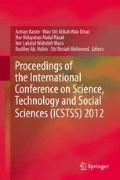Abstract
Wang et al. (Proc Int Conf Educ Inf Technol 1:535–537, 2010) mentioned that counseling has been traditionally conducted since 1960. Face-to-face counseling was enhanced with the introduction of peer group counseling during the 1970s. Counseling approaches have moved a step further with the emergence of the Internet technology. This advancement has paved the way for electronic or online counseling as a compliment to the traditional face-to-face counseling. The new method according to Murry (J Coll Stud Pers 13:562–566, 1972) has eased the tension off the student in getting counseling services. Palaniappan and Tan (Web based counseling system. In: Proceedings of the 2006 international conference on advanced computing and communications, pp. 50–53, 2006) explained that electronic counseling or e-counseling is a new way of helping people in dealing with various issues along with counseling matters. Thus, UNITEN guidance and counseling unit (GCU) felt that it is important to establish an e-counseling system to cater this need in UNITEN. The research will focus on developing the e-counseling system and monitor the maximum usage. The feedback on the e-counseling system was ascertained through survey from 52 respondents. The result shows most of the respondents felt satisfied by giving mostly 4 out of 5 in the Likert scale (M = 3.72; SD = .60). Overall, it delineates that the e-counseling service system is highly recommended by the students as it caters to their counseling needs.
Access this chapter
Tax calculation will be finalised at checkout
Purchases are for personal use only
References
Roy, H., & Gillet, T. (2008). E-mail: A new technique for forming therapeutic alliance with high-risk young people failing to engage with mental health service? A case study. Clinical Child Psychology and Psychiatric, 13(1), 95–103.
King, N. (2008). E-Counseling for international students to assist in successful transitions. Canberra: International Education Unit ACT Department of Education and Training.
Rassau, A., & Arco, L. (2003). Effect of chat-based on-line cognitive behavior therapy as study related behavior and anxiety. Behavioral and Cognitive Psychotherapy, 31, 377–381.
Shiller, I. (2009). Online counselling: A review of the literature. East Metro Youth Services.
Zelnick, L. (2011). “Can I show you something online?” or “How the elife come alive in therapy?’. Journal of Infant, Child and Adolescent Psychotherapy, 10(4), 411–414.
Murphy, L. J., & Mitchell, D. L. (1998). When writing help to heal: Email as therapy. British Journal of Guidance and Counseling, 26, 21–32.
Fischer, C. B., & Fried, A. L. (2003). Internet-mediated psychological service and the American Psychology Association Ethics Code. Psychotherapy: Theory, Research, Practise, Training, 40, 103–111.
Alias, H. I. (2001, July). Ketua Penolong Pengarah Bahagian Perkhidmatan Psikologi, Jabatan Perkhidmatan Awam. Implikasi Pelaksanaan Sistem Maklumat Pengurusan Sumber Manusia (HRMIS) Terhadap Perkhidmatan Psikologi (Kaunseling) Dalam Perkhidmatan Awam. Buletin Perkhidmatan Awam.
Hj Ninggal, M. T., & Syed Yahya, A. M. A. (2004). VOT 73043: Merekabentuk dan Membangunkan Perisian Alat Ukur Pengujian Psikologi Berasaskan Teknologi Perisian Web: Kajian Fasa Pengujian dan Fasa Implementasi Pembangunan E-Kaunseing (Peringkat 11), Pusat Pengurusan Penyelidikan UTM. Project Report. Faculty of Education, Skudai, Johor. (Unpublished).
Wang, Z., Chi, Y., Chen, H.Z., & Xin, R.F. (2010). Web peer counseling system. Proceeding of International Conference on Educational and Information Technology, 1, 535–537.
Murry, J. (1972). The comparative effectiveness of student-to student and faculty advising program. Journal of College Student Personnel, 13, 562–566.
Palaniappan, S., & Tan, J. E. (2006). Web based counseling system. In Proceedings of the 2006 international conference on advanced computing and communications, pp. 50–53.
Dionne, M. (n.d.). Advantages and disadvantages of online counseling. Free articles in crisis management – Tips, advice, strategies & solutions. Retrieved June 20, 2011 from http://crisis-management.bestmanagementarticles.com/a-2116-advantages-and-disadvantages-of-online-counseling.aspx
Author information
Authors and Affiliations
Corresponding author
Editor information
Editors and Affiliations
Rights and permissions
Copyright information
© 2014 Springer Science+Business Media Singapore
About this paper
Cite this paper
Radzi, H.M. et al. (2014). Initiative of Developing E-Counseling System: Importance and Application in UNITEN. In: Kasim, A., Wan Omar, W., Abdul Razak, N., Wahidah Musa, N., Ab. Halim, R., Mohamed, S. (eds) Proceedings of the International Conference on Science, Technology and Social Sciences (ICSTSS) 2012. Springer, Singapore. https://doi.org/10.1007/978-981-287-077-3_11
Download citation
DOI: https://doi.org/10.1007/978-981-287-077-3_11
Published:
Publisher Name: Springer, Singapore
Print ISBN: 978-981-287-076-6
Online ISBN: 978-981-287-077-3
eBook Packages: Humanities, Social Sciences and LawSocial Sciences (R0)

